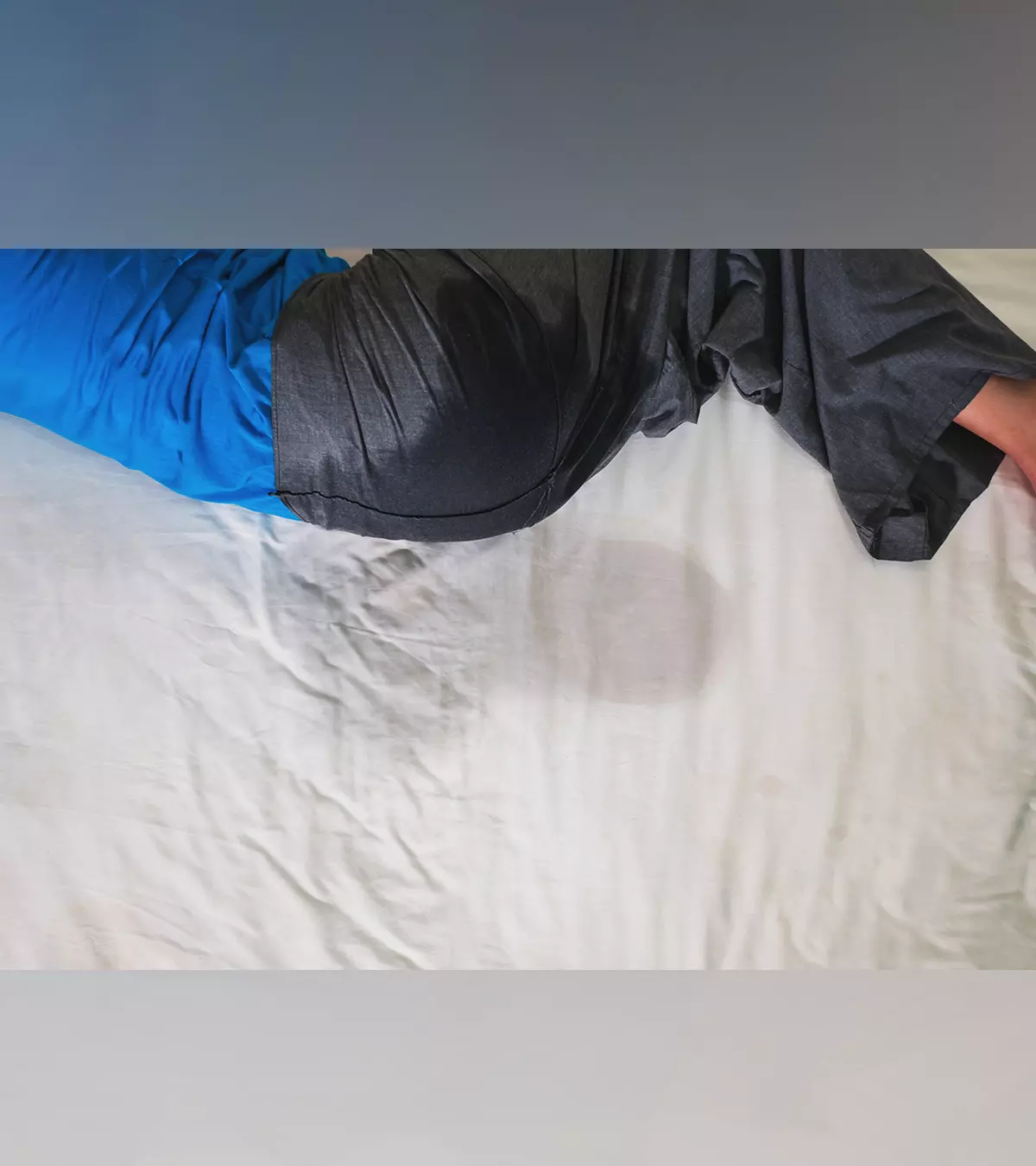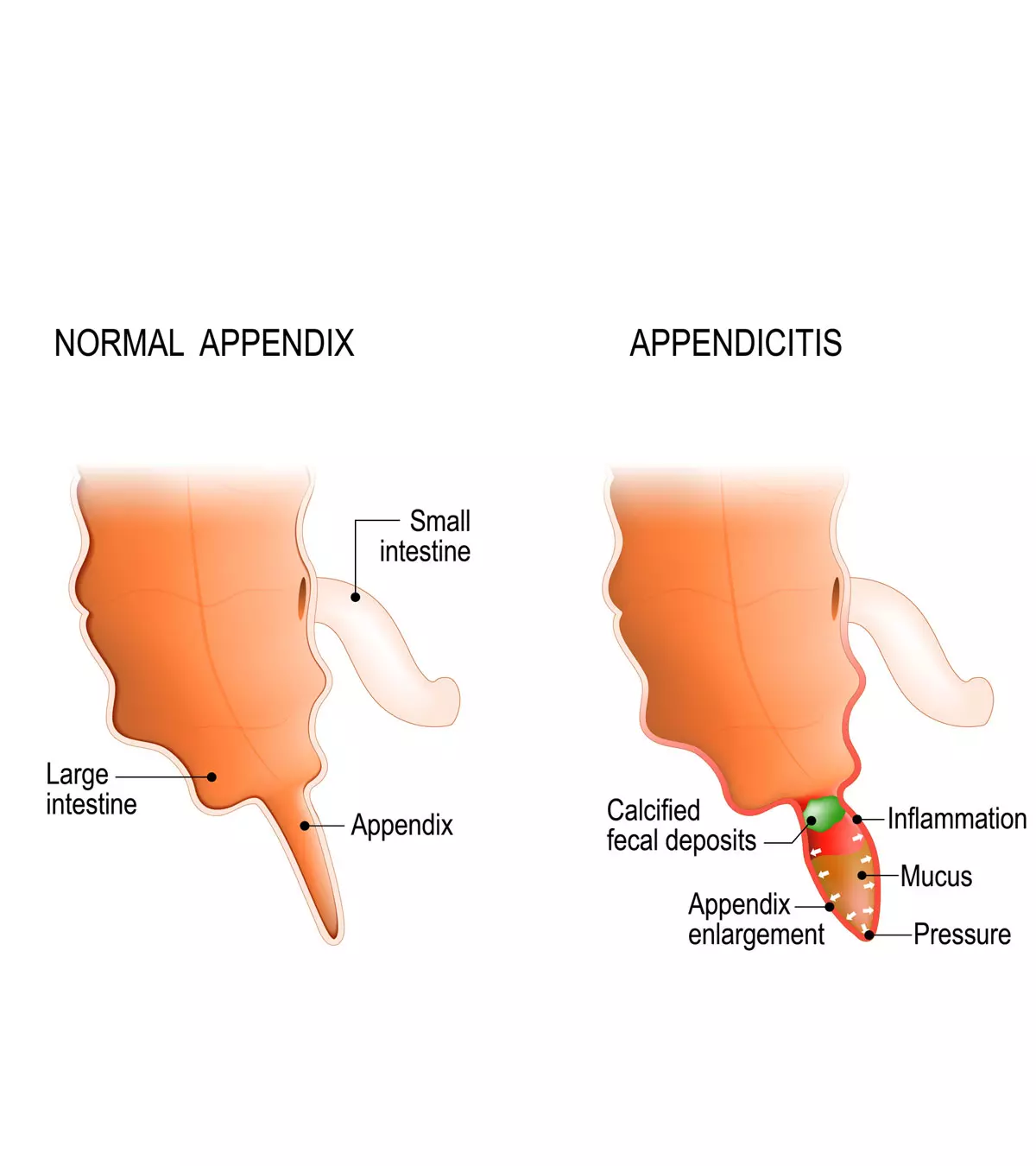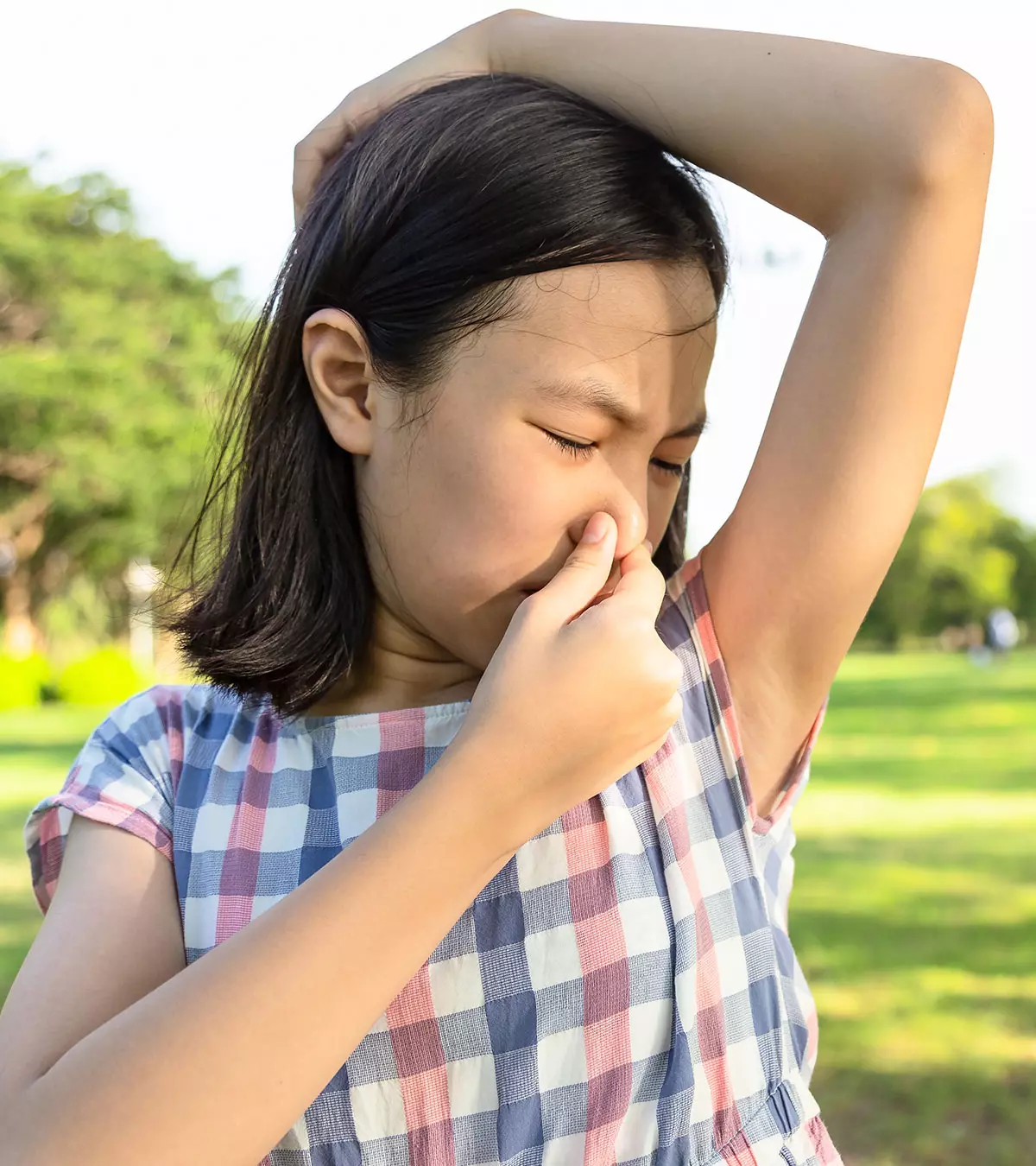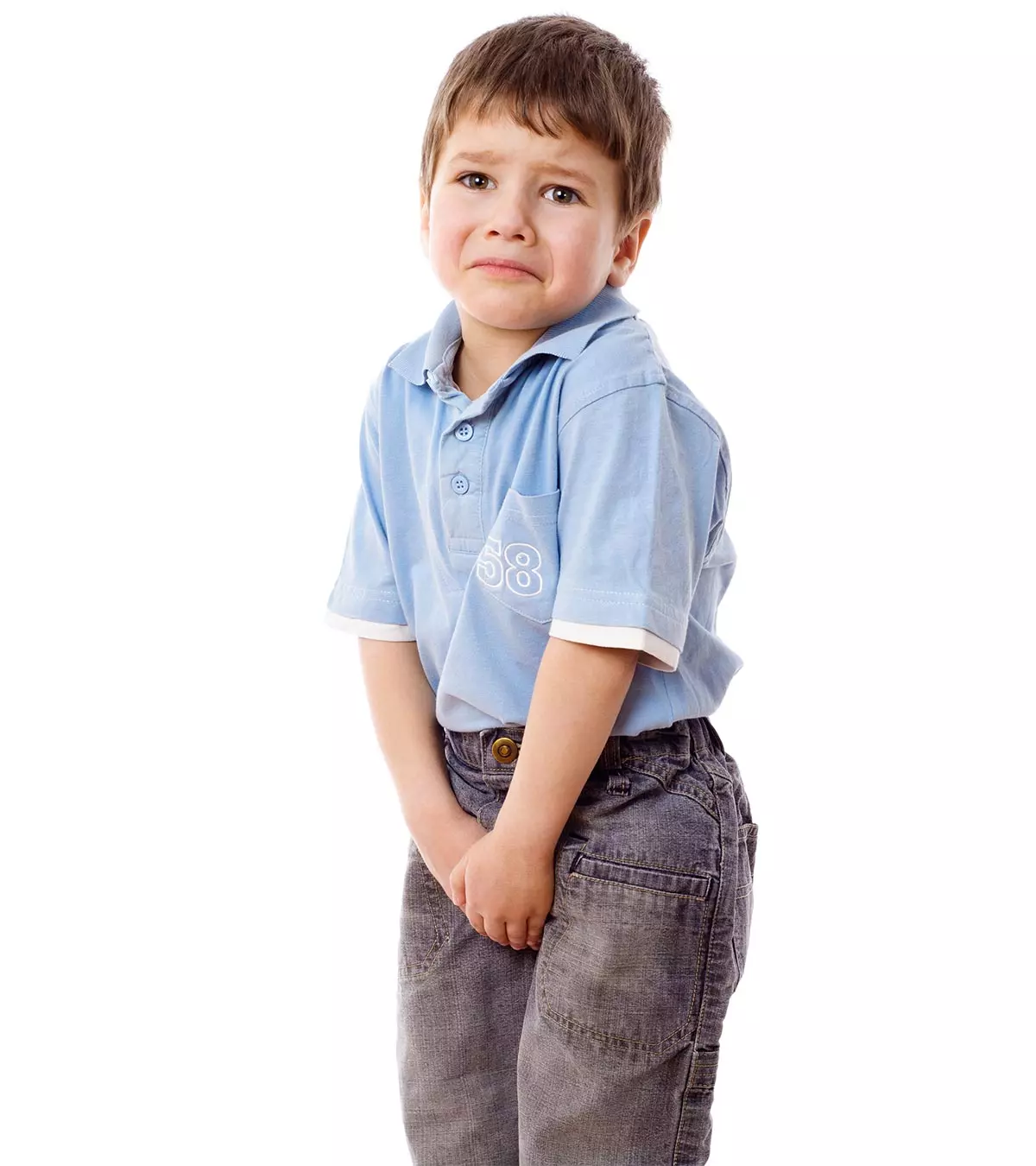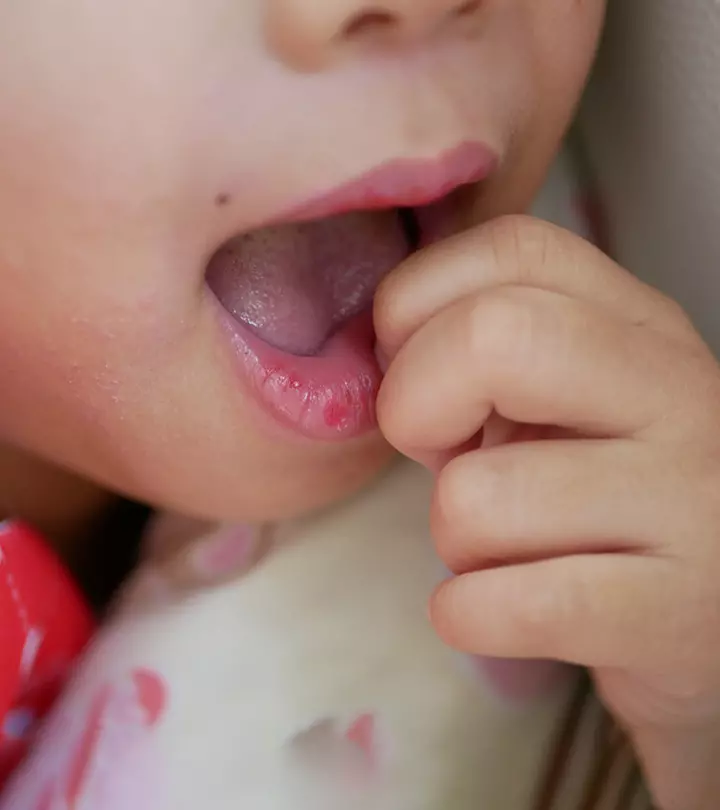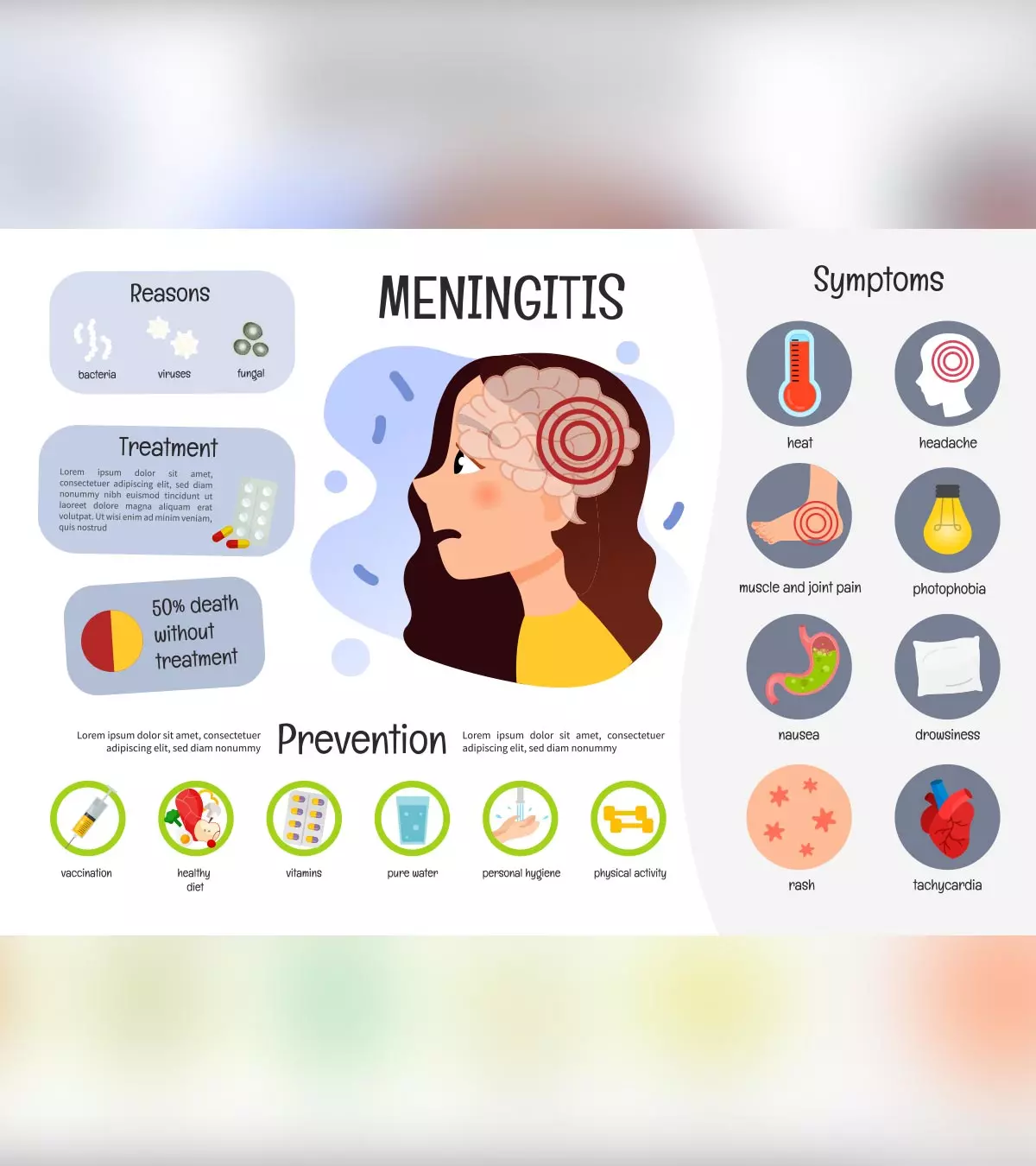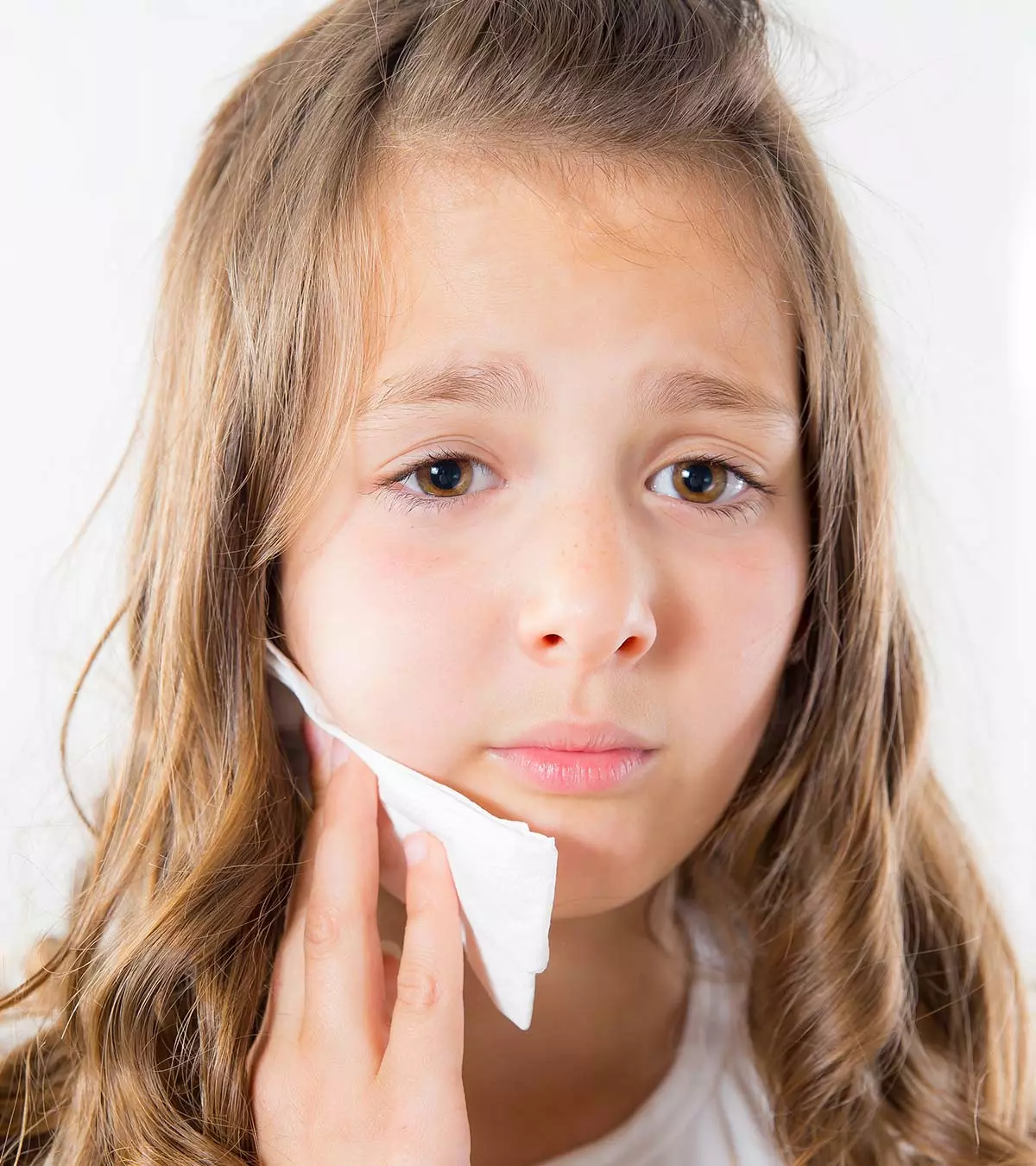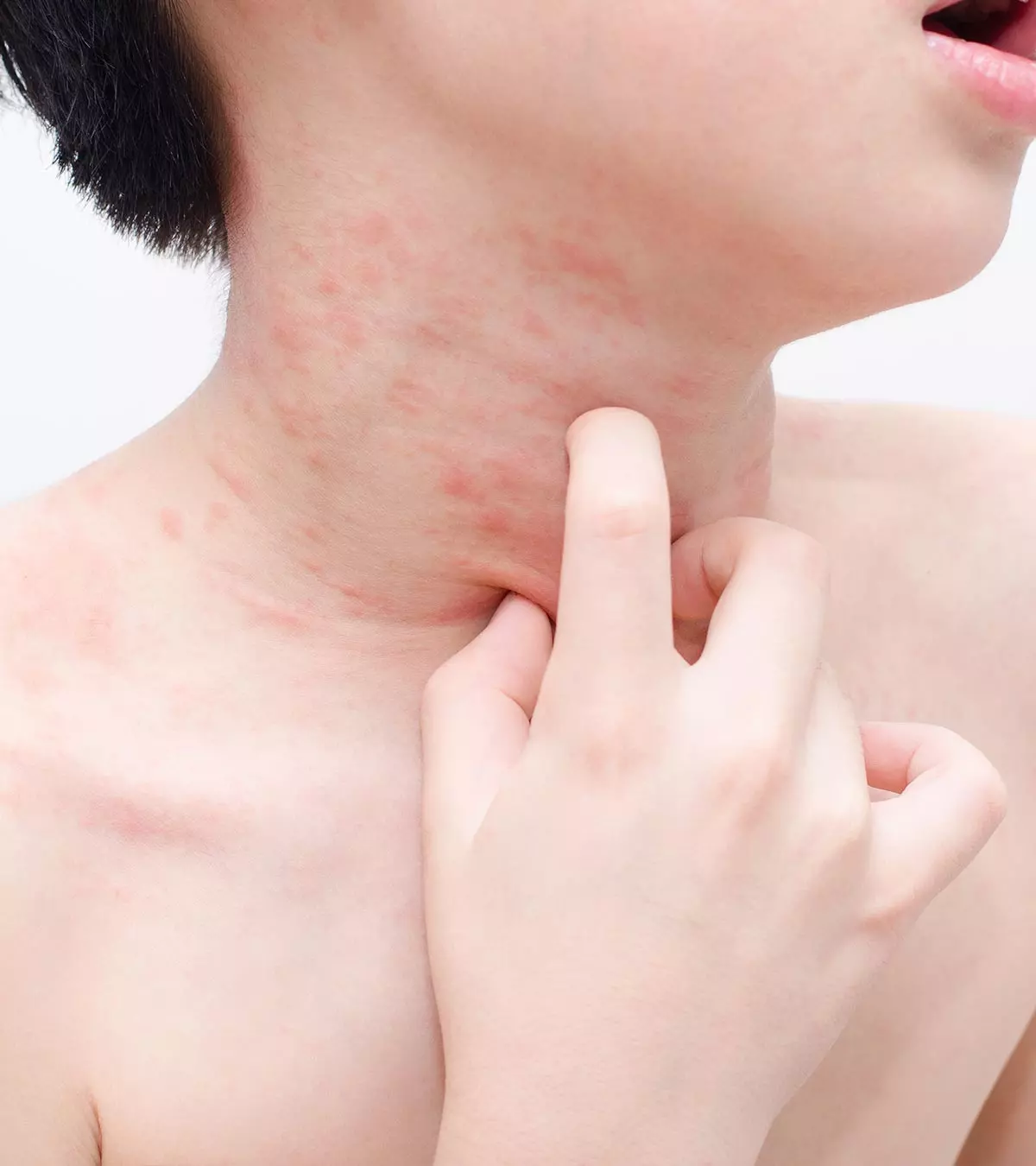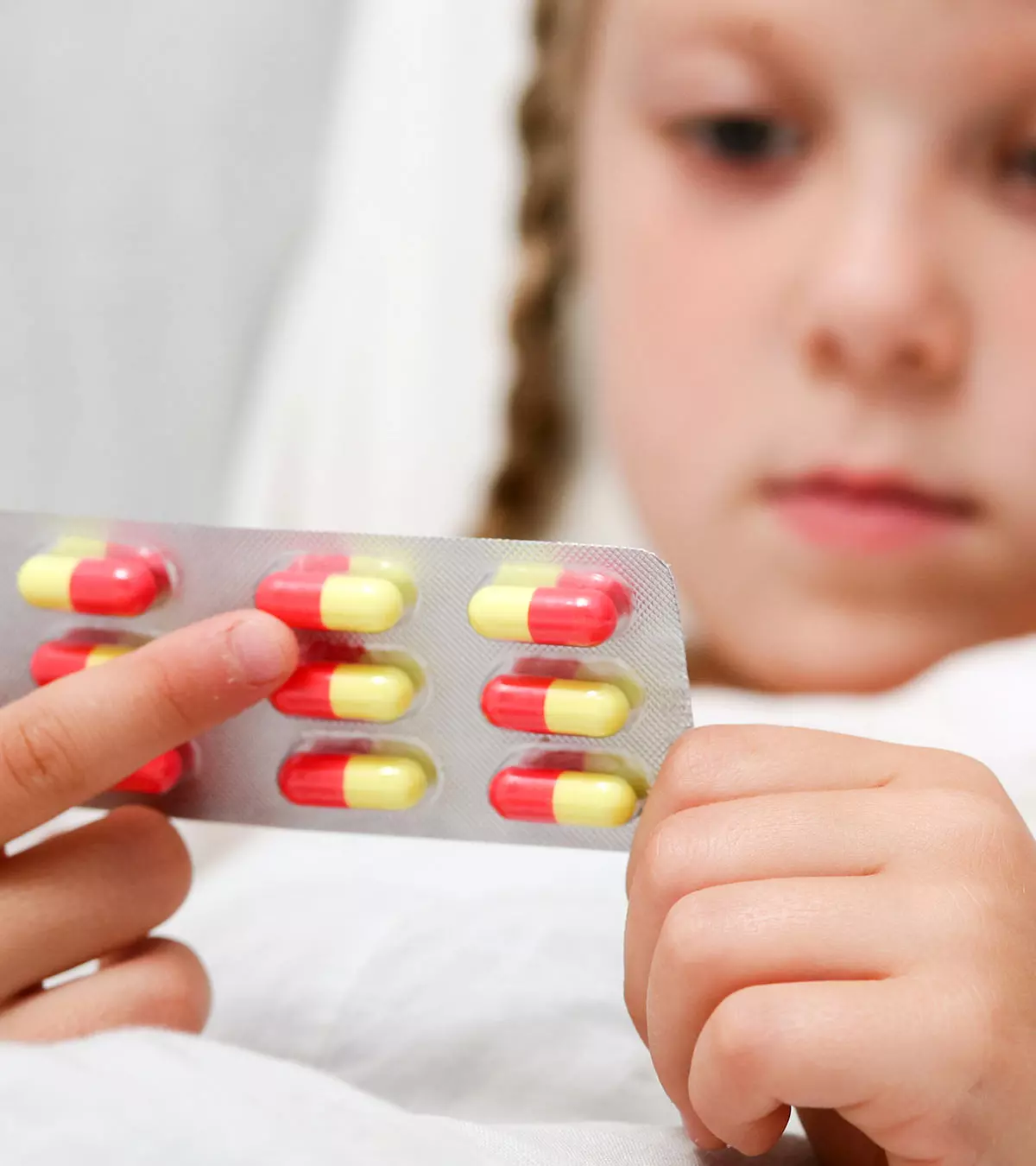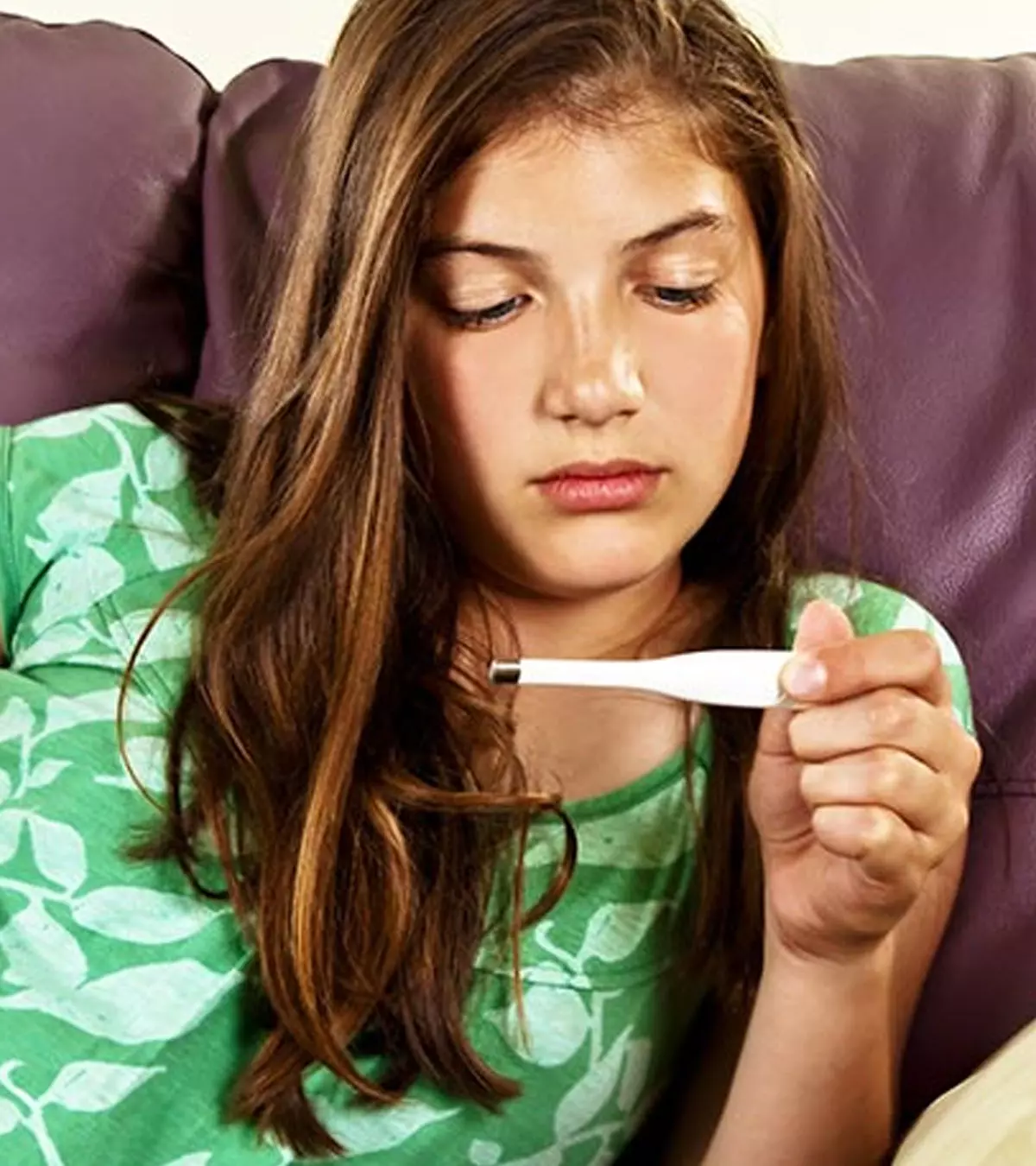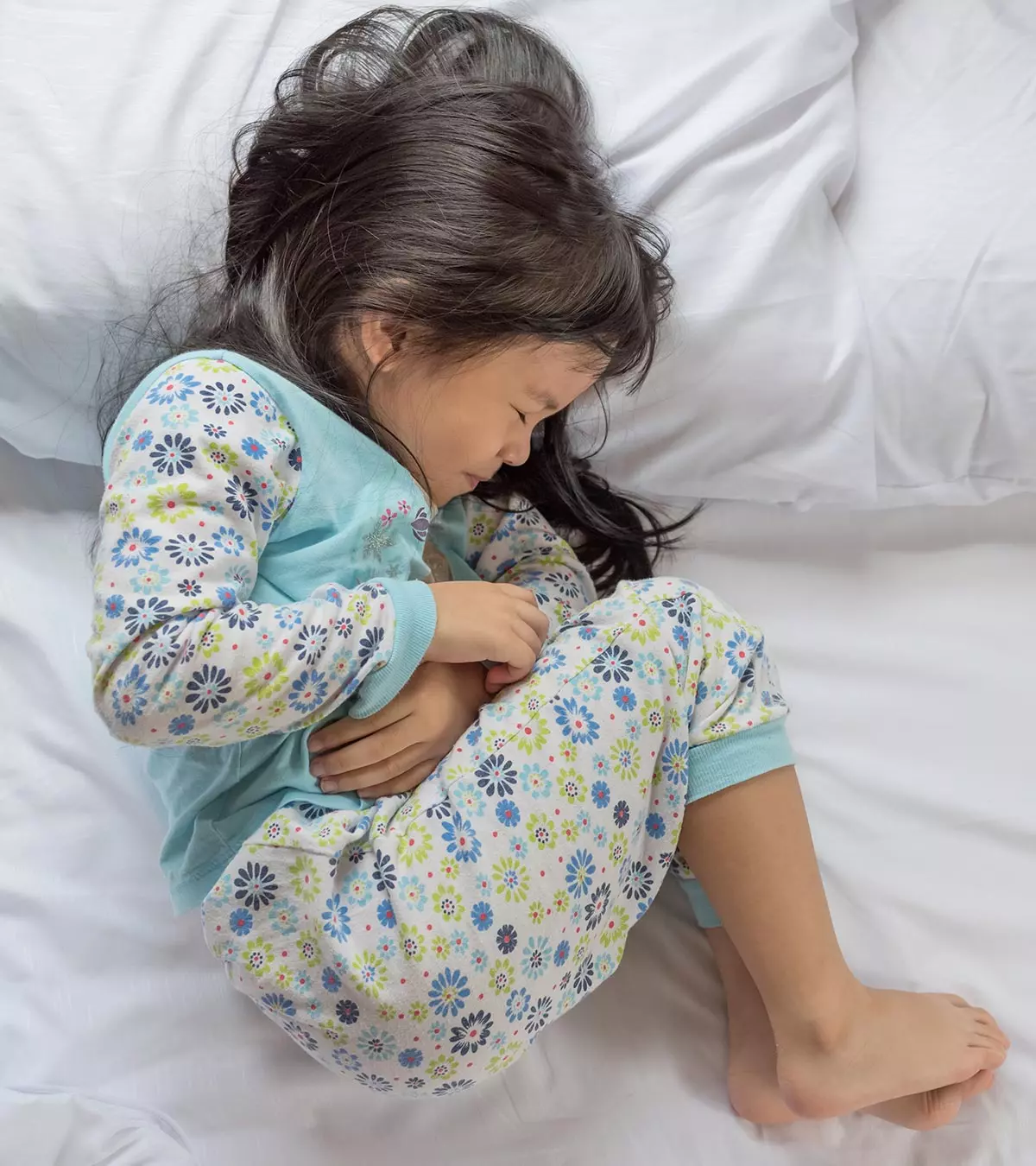
Image: Shutterstock

Worms in children are more common than in other age groups. These worms are also known as soil-transmitted helminth (STH) since they are transmitted through soil. Roundworms, whipworms, and hookworms are different species of parasitic worms (1). When left untreated, STH infections can cause complications such as malnutrition and intestinal obstructioniA gastrointestinal condition where the normal movement of contents through the intestine is blocked in children. If your child has just started school or is often found playing in soil, you must know how to identify and prevent these infections. Read on to learn more about the causes, effects, and treatment options of worm infections in children.
Key Pointers
- Worm infections in children are more common than in other age groups, and are also known as soil-transmitted helminths (STHs).
- Poor personal hygiene, unhygienic surroundings, ingesting tainted food or drink, or playing in contaminated dirt can contribute to STHs.
- STH infections can be identified via a stool test, anus examination, under-the-nail examination, breath test, and imaging tests.
- Worms can result in nutritional deficiencies, internal bleeding, diarrhea, and intestinal blockage because they feed on the nutrients in the gut.
- Prompt treatment is essential to minimize problems and stop the infection from spreading.
How Do Children Get Worms?
There are several ways through which children can get the infection by these worms, the common ones being poor personal hygiene and unclean surroundings. Here are the other ways in which your child is likely to catch the infection (3).
- Adult worms live in the intestines of people, feed on food, and produce thousands of eggs each day. These eggs are released into the soil when the infected person defecates in public. These eggs can get into your child’s body when they play in the soil and put their unwashed hands in their mouth. Exposure to contaminated soil can result in contracting several parasitic infections such as Strongyloidiasis (caused by roundworm Strongyloides stercoralis), Ascariasis (caused by roundworm Ascaris lumbricoides), or Trichuriasis (caused by whipworm Trichuris trichiura). These infections are also known as soil-transmitted helminth infections.
- The worms can also get transmitted through vegetables that are not cleaned or cooked properly.
- Drinking contaminated water or eating food with contaminated hands can also spread the infection.
- Worm eggs can live under fingernails and easily pass on if an infected person has fed your child or handled food without washing hands (2).
- Hookworm larvae can enter the body from any part of the body (especially feet) that is exposed to the infected soil. They penetrate the skin and travel through the body to the intestine, where they become adults (3).
- The microscopic parasite Giardia duodenalis or simply Giardia causes giardiasis, a diarrheal disease. It spreads very easily and even minor exposure to contaminated food, water, or surfaces can lead to infection, upon which it inhabits the intestines (27).
- Enterobiasis or pinworm in kids is a common parasitic infection among children which spreads from swallowing tiny eggs of the pinworm (28).
What Are The Symptoms Of Worms In Children?
Children who are infected by worms can have a variety of symptoms. However, the early signs are usually related to the intestine and digestion.
Early symptoms of infection

- One of the prominent symptoms of worm infection is an itchy bottom, and sometimes loss of appetite
- PicaiAn eating disorder characterized by the consumption of non-food substances such as dirt, clay, and paper or eating soil, cement etc., could be a hint towards worm infestation.
- Bloated tummy especially after meals.
- Indigestion presenting as passage of stools after every meal.
- Bad breath even after brushing teeth. As worms produce a lot of carbondioxide and other gasses it usually is released from the mouth causin halitosisiAn unpleasant odor coming from the mouth due to poor oral hygiene, medications, or health ailments .
- Diarrhea accompanied by weakness or fatigue.
- Some worms can cause abdominal pain or vomiting if the worm blocks the intestines.
- Scratching the bottom might cause a rash around the anus which may lead to infection, restlessness, or sleep disturbances
- Spotting adult worms in the child’s poo.
- Upon careful examination, you may find tiny worms around the child’s anus, if you especially check it the first thing after they get up in the morning (4)
Tennille Lindsay, a mother of three, found that her three-year-old, who loves playing in the mud, came crying and complaining of pain in the bum one day, followed by a reduction in his sleep and appetite over the next three days. She says, “On night 3, he went to sleep and wakes up hours later after leg twitching and crying out in his sleep. He says his bum is still hurting and ‘Mummy, please make it better.’ I thought, what can I do, he asked for a shower, so I undressed him, and then I saw them — 4 wriggling white threads around his bum (i).”
Symptoms Of Chronic (Long-Term) Infection
If the early symptoms are left undetected, then the infection can spread and cause the next level symptoms, such as:
- Not gaining weight or weight loss
- Vitamin A deficiency that can result in dry eyes
- AnemiaiA clinical condition where the body has low levels of healthy blood cells or hemoglobin is quite common and presents as irritability/lethargy, generalized weakness
- Malnutrition and intestinal obstruction (though rare still a few cases are reported every year (3)
- In case of heavy infections, itchy vagina and vaginal discharge in prepubertal girls and those who attained puberty (4).
Intestinal worms affect the child’s nutrition significantly.
If not treated immediately, side effects such as malnutrition may also lead to psychological and behavioral changes in children (5). Studies have also shown learning and cognitive difficulties in children with worm infestation, which improves after the treatment (29).
If your child shows some early symptoms of worm infections, it is best to make an appointment with your pediatrician, who will further diagnose the condition.
How Are Worms Diagnosed?

Some of the symptoms of worms in kids may also be suggestive of other illnesses. To diagnose the problem accurately, your doctor may conduct a few tests and exams.
- The doctor might ask you to examine your child’s poo (stool test for worms, ova, and cysts) for worms or to examine the child’s anus at night using a torch. He may even ask you to bring a stool sample for lab examination (6) (7).
According to Dr. James Walker, assistant professor of Clinical Medicine at LSU Health Sciences Center New Orleans, “The appearance of stool when infected with worms can vary depending on the type of worm and the severity of the infection. Common signs of a worm infection in stool include visible worms or worm segments, irregularities in shape or texture, and the presence of mucus or blood. However, the best way to determine if you have a worm infection is to consult a healthcare professional.”
- Abdomen ultrasound can sometimes visualize moving body worms or can give a hint towards worm infestation.
- Another method for diagnosing is analyzing samples from under the fingernails.
- In case of a few worms a breath test can lead to specific diagnosis
- A contrast CT brain and contrast enhanced MRI brain are the diagnostic modalities used for diagnosing worms in brain.
The appropriate treatment method must be initiated soon after the diagnosis to avoid possible complications.
What Are The Complications Of Having Worms In Children?
Once the child is infected with worms, they travel through the body and settle down in the intestine. They feed on the nutrients in the intestine and lay thousands of eggs, which hatch and spread the infection throughout the body. According to the World Health Organization, worms can also cause:
- Nutritional deficiency as they feed on the nutrients in the intestine.
- Internal bleeding, leading to the loss of iron and causing anemia.
- Diarrhea, impairment of digestion, and absorption.
- Intestinal obstruction, if the worms grow and become adults (1) (3).
- Rectal prolapse, caused by edema due to a severe infection.
 Did you know?
Did you know?How To Reduce The Risk Of Worms In Children?

Children who play in the dirt, sand, grass, and other open areas are likely to get worm infections. While worms can be easily eliminated through deworming, it is best to prevent worm infections as far as possible. Here are a few tips that can limit the chances of intestinal worms in children.
- Wash fruits and vegetables thoroughly before using them. Check them for any worm infestations before using them. Do not eat the fruit or vegetable, even if only a part of it is infested.
- Do not let your children eat unwashed salads, semi-cooked vegetables, or meat.
- Children should avoid eating raw meat, especially pork and fish.
 Quick fact
Quick fact- Do not let the children play barefoot in the grass, mud, or other outdoor areas. Instruct them to wear shoes, and also to wash their feet and hands thoroughly after playing outdoors.
- Clip your child’s fingernails and toenails regularly, because dirt and mud could easily get deposited in long nails.
- Give your children purified water or boiled water to drink. Also, instruct them to avoid drinking from public tanks unless you are certain it is safe.
- Do not let your children use swimming pools that do not meet the necessary hygiene requirements.
- Maintaining good personal hygiene for kids, such as washing hands after using the toilet and before eating food. According to the US Centers for Disease Control and Prevention (CDC), hand washing with soap can protect about one in every three children from diarrheal diseases (30).
- Always keep your surroundings clean and clean up after your pets.
- Talk to your doctor about deworming your children regularly as a precautionary measure.
- Always keep the toilet seat clean and disinfected.
- Wash the bedsheets in hot water after your child’s treatment. This can help destroy any worm eggs on them.
- In developing and underdeveloped countries, periodic mass drug administrations for worm infections in schools or communities can also effectively prevent the occurrence (31).
Further, Lindsay also suggests a few precautions she opted for. She says, “I carried on the washing, vacuuming, mopping, and strict routine when changing his nappies. I put down a hand towel and laid him on top, pulled the nappy down, wiped away any wormy things, which there were a few at a time, put old nappy and used wipes into a rubbish bag, double bagged this to make sure no escaping happened, followed by applying coconut oil, putting new nappy on, putting underwear over this, and putting long pants over this. We carried this on after each shower. I would use a two-litre container with bleach and hot water and throw it into the shower cubical to make sure no eggs survived, and I can tell you, all this is exhausting. I honestly felt like I didn’t want to touch anything in fear of getting infested with these horrible little buggers.”
These precautions may not eliminate the chance of your child getting worms, but only minimize it. That is why it is important to prevent and treat worm infections in children through a method called deworming.
What Is Deworming?
Deworming is a process that involves the use of medication to remove an infestation of worms in the intestine. The treatment aims at eliminating the worms and removing any infection that causes discomfort in the patient.
Intestinal worms can be easily removed by regularly deworming a child. If the worms are not removed, they can multiply by laying eggs in the intestine and can affect the growth and development of the child. They may also hinder the educational achievement of the child (8).
WHO recommends deworming of certain groups of people living in endemic areas at regular intervals, which primarily include preschoolers and school-aged children (3). WHO also recommends a mass drug administration (MDA) of preventative chemotherapy if the rate of occurrence of worm infection in an area is more than 20%, which means more than 20 children out of 100 have been diagnosed with worms. Usually, the drug is administered at an interval of 6-12 months, depending on the occurrence and intensity of the infection (29).
What Is The Treatment For Worms?
The treatment for worm infections varies on the type of worm that has infested the intestines. Your doctor may give anthelmintic drugs that are available in the form of syrup for toddlers and tablets for older children. Some of the commonly used medicines for worms in children are mentioned next.
- According to the World Health Organization’s recommendations, the preventive medication should be single-dose albendazole or mebendazole given annually or biannually (1).
- Pyrantel is another deworming medicine for children that your doctor may prescribe (9).
- In the case of pinworms, your doctor might prescribe special pinworm medicine to the child and other family members as well (10). This is because pinworms can easily spread in a household through contaminated bedding and other things.
- Since 2025, generic ivermectin tablets have also been recommended for the management of strongyloidiasis caused by the roundworm Strongyloides stercoralis (3).
The deworming tablets for children usually kill the parasites without causing any damage to the host, in this case, your child. The treatment period is typically short and lasts not more than a few days.
Avoid relying on over-the-counter worm medicine for children as they may not be suitable for toddlers and young children. Always visit the doctor and follow the dosage and treatment regimen to rid the child of worms. Even better, choose to deworm your children as a precaution to prevent an infestation.
Can Deworming Be Done Naturally?
Along with medications, natural remedies might help ease the discomfort that your child may be going through due to worm infection in the body. These may not necessarily cure the child of worms, but they can aid the treatment and prevent infections. However, it should be noted that there aren’t any scientific studies to prove the effectiveness of all these remedies, as most of them are based on anecdotal evidence, and may or may not be effective.
- Garlic: Laboratory and animal studies showed that 400mg of garlic 2-3 times a day could kill parasites; however, the effect on humans is not known. As garlic may increase the risk of bleeding, consult with your child’s doctor before using this remedy (11).
- Papaya: This fruit is said to have anthelmintic and anti-amoebic activities. In a study conducted on 60 asymptomatic Nigerian children with stool evidence of intestinal parasites, it was found that a mixture of air-dried papaya seeds and honey resulted in a 71.4% and 100% stool clearance for various parasites (12)
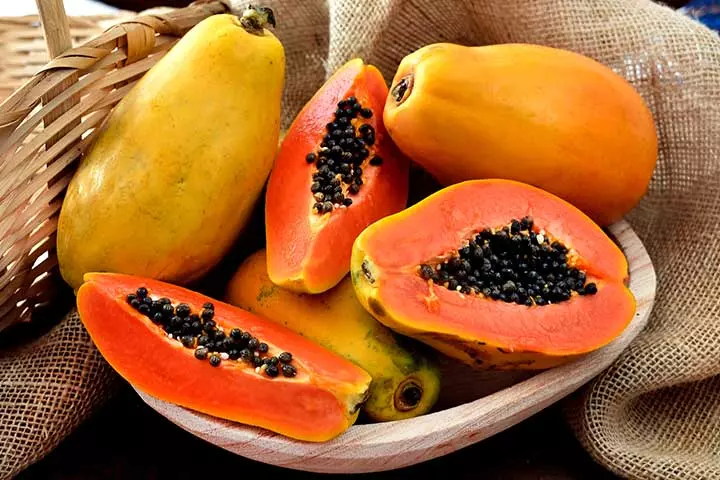
- Carom seeds: Locally known as ajwain, the fruits of this plant possess anthelmintic property. The seeds contain a brown colored oil which has thymol as one of its main components. This thymol is said to have antimicrobial properties. The plant may also help in expulsion of the worms from the gut (13).
It is believed that giving your child dried carom seeds to chew (mix it with a pinch of salt or jaggery if they cannot chew them raw) could help in expelling the worms. If the child is not willing to chew (seeds have a bitter taste), then you can powder the seeds and mix in water for them to drink or mix with jaggery to make tiny balls that they can easily swallow.
- Pumpkin seeds: A community study in China revealed that pumpkin seeds were indicated to be safe and effective in treating human tapeworm infections. It was also found that a mixture of pumpkin and areca nut extract was quicker to show action than pumpkin seeds alone (14).
- Bitter gourd: The extracts of various parts of this plant, such as leaf, fruit, and seeds, are found to have anthelmintic activity. It is believed that giving your child bitter gourd juice can help in deworming (15).
- Neem: According to a study conducted on children above three and six years of age, a mixture of neem flower powder was found effective in deworming (16). Also, anecdotal evidence states that administering children, neem fruit or flower extract can act as a precautionary measure to prevent worm infections.
- Turmeric: According to the traditional Indian medical system, turmeric could be helpful in deworming (17). It is believed that mixing turmeric powder in your child’s milk can help in expelling the worms.
- Coconut: It is believed that giving kernels and tender coconut water to kids might help in the expulsion of intestinal worms (18). Giving a tablespoon of grated coconut for breakfast might help in deworming.
These remedies can help alleviate the infection but may not cure it completely. Note that they are not a replacement for prescription medications. Also, it is best to consult your doctor before using any of the above remedies for your children.
Frequently Asked Questions
1. My child keeps getting worms. What should I do?
Regular deworming is necessary to prevent the recurrence of intestinal worms in children. Talk to your doctor about regular treatment to get rid of the parasites.
2. How often should I deworm my child?
If the prevalence of helminth infections transmitted by soil is over 20 percent, the treatment should be given once a year. If it is more than 50%, then the treatment should be given twice a year, as recommended by the WHO (1).
3. Can babies get worms?
It’s quite rare for infants to get worms as they are not exposed to the factors causing worms. Deworming is essential to prevent and eliminate worm infections in the intestines, mostly after one year.
4. Is there a specific age for deworming? Who should be dewormed?
According to the WHO, as a preventive measure, all children between ages 12-23 months, preschool children of 1-4 years of age, and school-aged children from five to 14 years of age should be dewormed. Deworming is recommended for pregnant women after the first trimester (1).
5. Are there any side effects of deworming children?
In general, worming medicines are well tolerated by children and have minimal side effects. Sometimes, there may be mild side effects in children who are heavily infected (19).
6. Can worms go away on their own?
Some children affected with worms, such as the ones that cause toxocariasis, might not need any treatment as the infection may resolve on its own (22). But for some infections that do not go away on their own, your child may need medical treatment (23).
7. Can children with worms go to school?
As children with intestinal worms can transmit to other children, it might be a good idea not to send them to school until they are treated (24).
8. Do worms cause cough and fever in children?
Children are prone to worm infections as they may often come in contact with soil contaminated with worm eggs. Your child may ingest these worms or eggs while eating with unwashed hands. These worms usually reside in the intestines, feed on ingested food, and cause symptoms such as itching around the anus, lack of appetite, and bloating. Chronic worm infection may cause weight loss, nutritional deficiencies, and other complications. Annual or biannual deworming of children is advised using medications under a physician’s supervision. Also, ensure that your child follows good hygiene practices, uses purified water, and avoids undercooked food to prevent worm infections.
Infographic: Common Worm Infections In Children
Children are more susceptible to various worm infections caused due to contaminated food and water. This infographic briefs some of the most common worm infestations and their causal organisms. Illustration: Momjunction Design Team
Illustration: Worm Infections In Children: Symptoms Treatment & Remedies
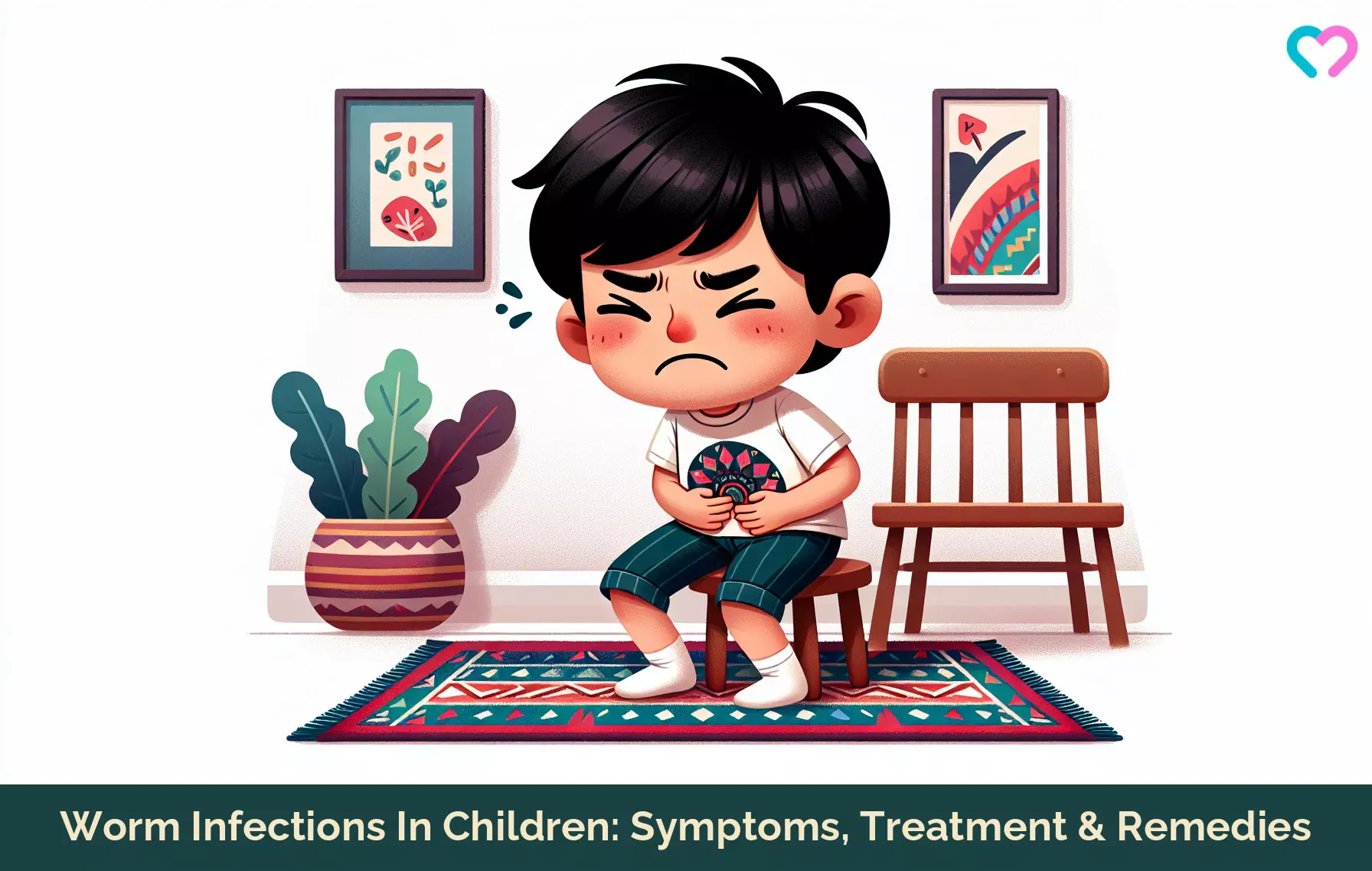
Image: Dall·E/MomJunction Design Team
Learn why intestinal parasite infections occur in toddlers and children with this helpful video! Get tips on the prevention, diagnosis, and best treatment options available for these common parasites.
Personal Experience: Source
MomJunction articles include first-hand experiences to provide you with better insights through real-life narratives. Here are the sources of personal accounts referenced in this article.
i. I curse the day those wriggly white threads invaded our toddler….
https://medium.com/@wholesome_evolu/i-curse-the-day-those-wriggly-white-threads-invaded-our-toddler-113050515e11
References
- Guideline: preventive chemotherapy to control soil-transmitted helminth infections in at-risk population groups; World Health Organization (2017)
https://apps.who.int/iris/bitstream/handle/10665/258983/9789241550116-eng.pdf - National Deworming Day; National Health Portal
https://www.nidirect.gov.uk/conditions/worms-humans - Soil-transmitted helminth infections; World Health Organization
https://www.who.int/news-room/fact-sheets/detail/soil-transmitted-helminth-infections - Worms in childhood; Queensland Government
https://www.qld.gov.au/health/condition/child-health/infections-and-parasites/worms-in-childhood - Liu J, Raine A.; The effect of childhood malnutrition on externalizing behavior; Current Opinion in Pediatrics
https://www.ncbi.nlm.nih.gov/pubmed/16969174 - Roundworm Infections in Children; Lucile Packard Children’s Hospital
https://www.stanfordchildrens.org/en/topic/default?id=roundworm-infection-in-children-160-54 - Diagnosing Pinworms.
https://www.cdc.gov/pinworm/diagnosing/?CDC_AAref_Val=https://www.cdc.gov/parasites/pinworm/diagnosis.html - Rashidul Haque; Human Intestinal Parasites; NCBI
https://www.ncbi.nlm.nih.gov/pmc/articles/PMC2754014/ - Pyrantel; medlineplus
https://medlineplus.gov/druginfo/meds/a682820.html - Pinworms; Seattle Children’s Hospital
https://www.seattlechildrens.org/conditions/a-z/pinworms/ - Roundworms; Milton S. Hershey Medical Center
http://pennstatehershey.adam.com/content.aspx?productid=107&pid=33&gid=000144 - Okeniyi JA, Ogunlesi TA, Oyelami OA, Adeyemi LA; Effectiveness of dried Carica papaya seeds against human intestinal parasitosis: a pilot study: NCBI
https://www.ncbi.nlm.nih.gov/pubmed/17472487 - Ranjan Bairwa, R. S. Sodha, and B. S. Rajawat; Trachyspermum ammi; NCBI
https://www.ncbi.nlm.nih.gov/pmc/articles/PMC3358968/ - Li T, et al.; Usefulness of pumpkin seeds combined with areca nut extract in community-based treatment of human taeniasis in northwest Sichuan Province, China.; NCBI
https://www.ncbi.nlm.nih.gov/pubmed/22910218 - Sutthaya Poolperm and Wannee Jiraungkoorskul; An Update Review on the Anthelmintic Activity of Bitter Gourd, Momordica charantia; NCBI
https://www.ncbi.nlm.nih.gov/pmc/articles/PMC5414453/ - K. Indumathi; Effectiveness of neem flower powder for worm infestation in pre-school children in selected villages at Cheyyur Taluk; Dr. MGR Medical University
http://repository-tnmgrmu.ac.in/4654/1/3004083indumathik.pdf - Sahdeo Prasad and Bharat B. Aggarwal; Turmeric, the Golden Spice; NCBI
https://www.ncbi.nlm.nih.gov/books/NBK92752/ - Manisha DebMandal, and Shyamapada Mandal; Coconut (Cocos nucifera L.: Arecaceae): In health promotion and disease prevention; Research Gate
https://www.researchgate.net/publication/51504364_Coconut_Cocos_nucifera_L_Arecaceae_In_health_promotion_and_disease_prevention - School Deworming; World Health Organization
https://www.who.int/docs/default-source/ntds/soil-transmitted-helminthiases/school-deworming-at-a-glance-2003.pdf?sfvrsn=a93eff88_4 - Ascariasis.
https://kidshealth.org/en/parents/ascariasis.html - About Cysticercosis.
https://www.cdc.gov/cysticercosis/about/?CDC_AAref_Val=https://www.cdc.gov/parasites/cysticercosis/gen_info/faqs.html - Toxocariasis.
https://kidshealth.org/en/parents/toxocariasis.html#:~:text=A%20child%20with%20mild%20symptomsthat%20will%20kill%20the%20larvae - Pinworm infection.
https://www.mayoclinic.org/diseases-conditions/pinworm/diagnosis-treatment/drc-20376386 - Worms
https://raisingchildren.net.au/guides/a-z-health-reference/worms - Roundworms
https://my.clevelandclinic.org/health/diseases/15240-roundworms#:~:text=Roundworms%20are%20parasites%20that%20needcan%20cause%20diarrhea%20and%20fever. - Roundworm Infection in Children
https://www.stanfordchildrens.org/en/topic/default?id=roundworm-infection-in-children-160-54 - Noel Dunn and Andrew L. Juergens; Giardiasis; StatPearls; NIH
https://www.ncbi.nlm.nih.gov/books/NBK513239/ - Worms; The Royal Children’s Hospital Foundation.
https://www.rch.org.au/kidsinfo/fact_sheets/Worms/ - David Addiss; Tackling worms in children: school programmes can work – for eyes too; Community Eye Health Journal.
https://pmc.ncbi.nlm.nih.gov/articles/PMC3756647/ - Hand Hygiene; CDC
https://www.cdc.gov/museum/pdf/cdcm-pha-stem-hand-hygiene-lesson.pdf - Parasitic Infections in Children; CDC
https://www.cdc.gov/parasites/children/index.html
Community Experiences
Join the conversation and become a part of our nurturing community! Share your stories, experiences, and insights to connect with fellow parents.
Read full bio of Dr. Charu Kalra
- Dr. James Walker is a clinical doctor with over 10 years of experience managing patients. He currently works as an assistant professor of Clinical Medicine at LSU Health Sciences Center New Orleans. He did his MD from the University of Mississippi Medical Center.
 Dr. James Walker is a clinical doctor with over 10 years of experience managing patients. He currently works as an assistant professor of Clinical Medicine at LSU Health Sciences Center New Orleans. He did his MD from the University of Mississippi Medical Center.
Dr. James Walker is a clinical doctor with over 10 years of experience managing patients. He currently works as an assistant professor of Clinical Medicine at LSU Health Sciences Center New Orleans. He did his MD from the University of Mississippi Medical Center.
Read full bio of Dr Bisny T. Joseph
Read full bio of Swati Patwal
Read full bio of Anindita Ghatak






